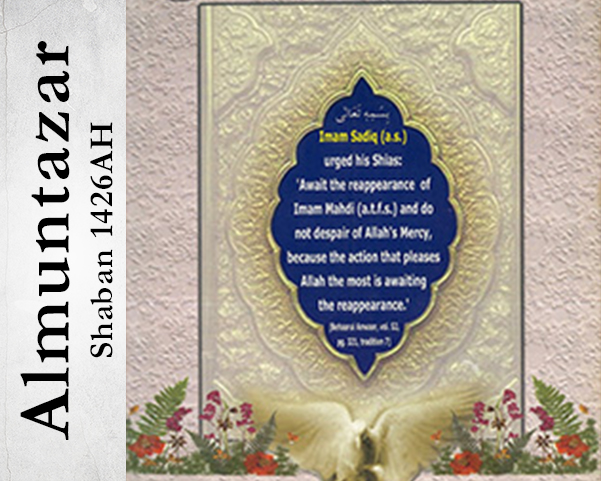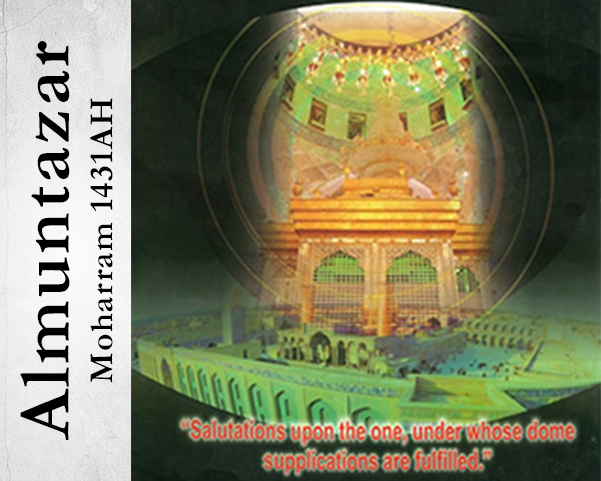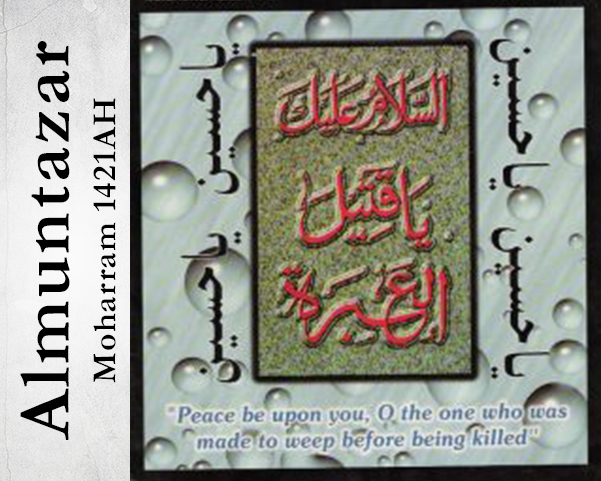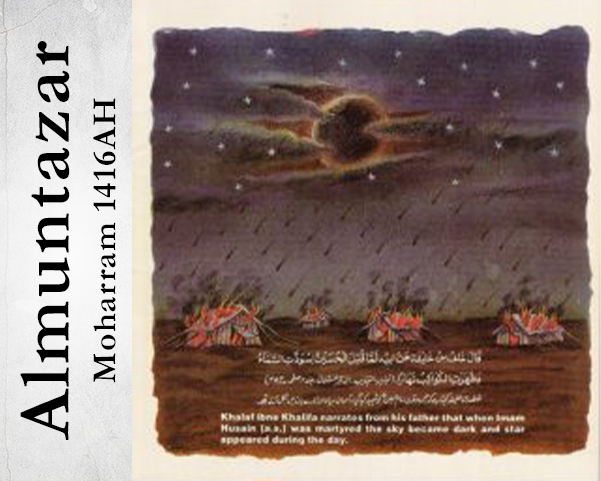The martyrdom of Imam Husain (a.s.) is a mammoth event that triggered a revolution in the society. If we evaluate closely the agitations and revolutions that took place post Karbala, we will find a connection at some level with Imam Husain (a.s.) whose thoughts and mission ignited the hearts of the people and encouraged them to rise up against injustice. Perhaps, this is the reason why every community in the world is conscious of the uprising of Imam Husain (a.s.) as also why this topic was written about in every age and this trend will continue till the end of time. The proof of this lies in the fact that there are innumerable books written specifically concerning the events of the Day of Ashoora offering a historical perspective of the martyrdom. Each of these books is unique in terms of its individuality and personality. However, this treatise refers to a book that does not limit itself only to the history of Imam Husain (a.s.) and his companions on the Day of Ashoora. Rather, it also offers a perspective from the aspects of jurisprudence, religious fundamentals, beliefs, history, gnosis, mysticism, etc. all in a single place. This is because the author of this book has written it in many sittings and commenced this book with twelve introductory articles. He has followed each speech with additional points which substantiate and lend credence to the points made in the speech; or which explain the philosophy of the points or which give a complete perspective to the events; or simply bring forth such hidden aspects for which it is more appropriate to say that it is a style which is characteristic of the author himself. The reason for this is that the author of this book was not just a writer and a competent speaker. Rather, he was a jurist, an authority for reference (Marja’), a researcher and a personality that encompassed several streams of knowledge. This fact is further endorsed by the great scholar Allamah Tehrani who in his book Tabaqaat’e Aalaame’ Shia has described him by using adjectives such as “ocean of knowledge”; “wise orator”; “proficient jurist”; “man of traditions” in his praise.
The first preface of this book deals with the discussion on why Allah the Almighty did not protect the Holy Imams (a.s.) from their enemies and permitted that they be killed. In other words, why Imam Husain (a.s.) was killed by his enemies and apparently Allah did not take any steps to protect him.
Introduction : With regards to the martyrdom of the Imams (a.s.), the oppressions they faced and the difficulties in which they were engulfed, Allamah Majlisi (r.a.) says that in the books Kamaaluddin, Ehtejaaj and Elal al-Sharaae’ it is narrated as follows –
Mohammed Ibn Is’haaq Taaleqani reports that we were in the presence of Shaykh Abul Qasim Ibn Rauh (r.a.) along with a group which included Ali Ibn Eesa Qasri. One person from the group stood up and addressing Husain Ibn Rauh (r.a.) sought permission from him to ask a question. He replied that he may ask whatever question he wanted. He asked, “Was not Imam Husain (a.s.) the designated leader and the proof of Allah?” Husain Ibn Rauh (r.a.) replied, “Yes, undoubtedly he was.” The person then asked, “Was not the killer of Imam Hussain an enemy of Allah?” Husain Ibn Rauh (r.a.) again responded in the affirmative. Then the person questioned, “Is it appropriate and acceptable that Allah the Almighty allows His enemy to overcome His proof and designated leader?” Abul Qasim Husain Ibn Rauh (r.a.) retorted, “Listen carefully to what I have to say. Indeed, Allah the Almighty does not address His creatures directly and nor does He speak to them. Rather, He has placed His Prophets and His Messenger amongst them and with characteristics similar to the people. If Allah would have sent His Prophets as a different kind of creature, the people would have run away from them and would have never accepted them. However, when the Prophets came amongst them as men, and ate along with them and walked with them in their markets, the people said, ‘We will not submit to you till you present a thing which we are unable to bring and categorically establish that you are a special creation of Allah while we are not.’
Therefore, Allah granted them miracles that were beyond the capacity of ordinary mortals. The Prophets (a.s.) exhibited different miracles in line with the unique characteristics of their eras. Then some Prophets (a.s.), after warning their communities, sought punishment for them; thus a storm overcame the oppressors and tyrants of the society and annihilated them. Another Prophet (a.s.) was thrown into a fire, which was cooled for him by the Almighty. Yet another Prophet (a.s.) produced a she-camel from solid rocks and caused pure milk to flow from its udders. And yet another crafted a path in the seas and caused a spring to flow from a rock. One amongst them granted eyesight to the blind, cured the lepers and by the permission of Allah, granted life to the dead. Finally, the seal of them split the moon into two halves and even spoke to animals such as wolves and camels.
When such miracles were presented and ordinary people were unable to replicate them, Allah the Almighty, through His Grace, Mercy, Wisdom and Decree, granted superiority to His Prophets (a.s.) over other creatures and due to which they were always successful. While in other situations, Allah caused them to be subjugated. If Allah would have granted them supremacy in every condition and not caused them to be engulfed by difficulties and tested through examination, people would have forsaken Allah and accepted the Prophet (a.s.) as their lord; the merits of patience and turning towards Allah in difficulties and success in examination would have been lost forever.
However, Allah the Almighty made the circumstances of the Prophets (a.s.) and their successors (a.s.) similar to those of the people so that they exhibit patience in times of difficulties, torment and examination; that they display gratitude in conditions of safety and difficulties and in times of success over their enemies; that in every condition they remain humble and do not incline towards oppression and tyranny. All this was to remind the creatures of Allah that they have a Lord and that the same Lord is their Creator and Sustainer; that He is the One who decrees their affairs for them so that they worship (only) Him and obey His Messenger (a.s.); so that His proof is completed upon those who tormented them or accused them of divinity or those who opposed and bore enmity towards the message of the Apostles of Allah (a.s.). This was so that the destruction and salvation of the people was only after all the divine signs and communications were manifested for them”
Mohammed Ibn Ibrahim Ibn Ishaq says that “The next day I was sitting in the presence of Husain Ibn Rauh. My heart was saying to myself – whatever he said yesterday, was it from his own side?” At that instant, Shaykh Husain Ibn Rauh turned towards me and said, “O Mohammed! If I live high in the skies and from there the birds hurl me down or if the winds toss me in the valleys, it is more acceptable for me than to speak any thing about the religion of Allah from my own side and offer my personal view about any matter.”
In the same preface, the author narrates an event from the Sunni scholar Mufti Idreesi who reports that once we were seated with several scholars at a place frequented by several people. Incidentally, an Ajamee (a non-Arab) passed from there. The scholars did not invite him as he was an ignorant person. Rather, they began to tease and taunt him. One amongst them said, “O Ajamee! O stupid fellow! Why do you people start behaving like children every year during Moharrum? Why do you beat and throw mud on your chests? Or wail and cry out, Ya Husain! Ya Husain?
The Ajamee turned around and said, “Do you know the secret behind our actions? These actions are necessary and obligatory upon us. If we leave these actions and do not observe them for a period of time, you people will claim that the accursed Yazeed did not martyr the beloved of the Holy Prophet (s.a.w.a.) and Fatemah (s.a.) and did not render homeless the daughters of the Prophet (s.a.w.a.). Rather going a step further, you will claim that the event of Karbala had not occurred at all.’
The people asked, “Why would we do that?” The Ajameee replied, “This is because we have experienced such a thing in the past and have witnessed this over and over again with our own eyes.” The people asked, “When was this and how?” He replied, “Surely the Prophet of Allah (s.a.w.a) appointed his cousin brother as his heir, as the prince of the believers, as the leader of the successors, as the Imam and Caliph by the order of Allah. This event presented itself after the farewell Hajj at Ghadeer Khum. And at that time, more than 70,000 men had gathered to perform the Hajj. This event reached you from several sources and is even recorded in your books. However, when you observed that the Shiahs, on account of Taqaiyyah or fear, did not celebrate the event of Ghadeer, which is Islam’s greatest Eid, you turned away from religion, opposed the order of Allah and His Messenger and blatantly denied the event of Ghadeer. That is why, every year during Moharrum, we conduct gatherings, recite elegies and lamentations, mourn and grieve, revive the memories of the difficulties inflicted upon Imam Husain (a.s.) and curse his killers so that we quell the desire in your hearts to deny this event which is more manifest than the sun.”
When the people heard this, they had goose-bumps; they started shivering, bowed their heads in shame and fixed their gaze on the ground. They started looking at each other and said – “By Allah! This person has been inspired by Allah to utter such words for surely he is an ordinary person, ignorant of the ways of the scholars and the means of debate’
Rewards and Merits of Crying for Imam Husain (a.s.)
A special aspect of “Asraare Shahaadat” is that Marhoom-e-Darbandi (r.a.) has, in the second article of this book, comprehensively discussed the topic of crying upon Imam Husain (a.s.) in the light of its merits, rewards and of it being a great worship. For example, he reports a tradition from Muntakhab about Imam Sadiq (a.s.) – ‘On sighting the moon of Moharrum, there would be an increase in the grief and sorrow of Imam Sadiq (a.s.). He (a.s.) used to lament uncontrollably over his grand father Imam Husain (a.s.) and people from every region would come to offer their condolences to him (a.s.). They used to recite elegies remembering the calamities upon Imam Husain (a.s.) and beat their chests in grief. When they would conclude their lamentation, Imam (a.s.) would address them saying, “O people! Know that Imam Husain (a.s.) is alive before Allah and is acquiring his sustenance as he desires. His attention is constantly on Karbala where he was martyred along with his companions. He witnesses the visitors to his grave, those who weep upon him and mourn him. He recognises those who grieve over him and knows their names and the names of their fathers. He is cognisant of their position and status in Paradise. Surely, the Imam (a.s.) knows those who lament him and he (a.s.) seeks forgiveness for them. He recommends their forgiveness to his holy grandfather (s.a.w.a), his respected father (a.s.) and mother (s.a.) and his compassionate brother (a.s.).’’
The Imam (a.s.) also said, “If only the visitors to my grave and those who cry out of grief were aware of their reward and status before Allah, they would be pleased with their lamentation. Surely, my visitor and mourner will return to his family while he is happy and content. When he gets up from the gathering of mourners, he will not have a single sin to his name and he will be as when his mother had given birth to him.’
Further, the author reports a tradition from Mo’awiyah Ibn Wahab who narrates that “I sought permission from Imam Sadiq (a.s.) to depart and Imam (a.s.) granted me the same. When I went to the Imam (a.s.), I saw that he was on his prayer mat. I waited till such time that Imam (a.s.) completed his prayer. Thereafter I heard the Imam (a.s.) supplicate to Allah (s.w.t.) in the following words –
‘O the One, who granted us respect and nobility, preferred us for successorship and promised us intercession; He granted us the knowledge of kingdoms and caused the hearts of the believers to incline towards us. Forgive me, my brothers and the visitors to the grave of my ancestor, Imam Husain (a.s.); those who spend their wealth in our way and bear physical difficulties out of love for us with the hope that a great reward awaits them from You on our account. They have pleased the heart of Your Prophet (s.a.w.a.), hastened to fulfil our commands and caused distress to our enemies and, through this, they seek Your pleasure. O my Lord, for our sake, be satisfied with their deeds and watch over them every day and night. O my Lord, they have left their families (for Ziyarat), so cause their families to be in a good condition. Protect them from the tyranny of every tyrant and assist them. Guard them from Your creatures, whether they be powerful or weak. O my Lord, fulfil their desires, whatever they may be, which they harbour in their heart from the time they left home (for Ziyarat). For surely, they have left their children, relatives and comforts; preferred us over their spouses and sacrificed (their company) for us. O my Lord! Their neighbours have mocked them over leaving their houses (for Ziyarat) and have ridiculed them. Yet there is nothing that prevents them from reaching us unlike those who oppose us.
O Allah! Have mercy upon the faces that have been altered due to the searing heat of the sun; bestow Your mercy upon those cheeks which are rubbed on the grave of Imam Husain (a.s.); bestow Your mercy upon those eyes which cry in grief upon our misfortunes; have mercy upon those hearts which are agitated and restless for us and have mercy upon those cries which are raised for us. O my Lord! I entrust them and their bodies in Your custody till such time that you deliver them to us at the Pond of Kauthar on the day which is a day of great thirst.”
Imam (a.s.) was constantly reiterating this supplication in his prostration. When he completed his prayer, I asked him (a.s.) – ‘May my life be sacrificed for you! If the supplication which I just heard from you were made in favour of a person who disbelieves in Allah, the fire of hell would not touch him. I swear by Allah, the feeling I have is of regret that I went for Hajj and ignored the Ziyarat of Imam Husain (a.s.)’ (the Hajj mentioned here does not refer to the obligatory Hajj).
Imam (a.s.) said, “I have brought you closer to this (Ziyarat). Then what prevents you from it?” Then he continued, “O Mo’awiyah, do not leave the Ziyarat.” I replied that I did not know so much in its regard.
Then Imam (a.s.) said, “O Mo’awiyah, the number of those who pray for the visitors of Imam Husain (a.s.) is greater in the skies than in the earth. Do you not want that Allah should include you in the group of people for whom the Holy Prophet (s.a.w.a.), H.Ali (a.s.), J.Fatima (s.a.) and all the Imams (a.s.) supplicate? Do you want to be included amongst those people who have all the sins of the past forgiven and have left the world in the condition that 70 years of their sins have been forgiven? Do you not wish that when you leave this world, your shoulders are not burdened with even a single sin? Do you not wish to be included amongst those who will shake hands with the Messenger of Allah (s.a.w.a.) tomorrow?”
(Wasaael al-Shiah, vol. 14, p. 411, H. 19482, Chapter 37)
After narrating this tradition, Marhoom Darbandi says, “The tradtions about mourning and crying on Imam Husain (a.s) that I have mentioned over here are like a handful of from a stockpile of wheat. Even if there was no other tradition on the excellence of mourning for Imam Husain (a.s) – except that of Muawiyah ibn Wahab, – it would have sufficed for us.”














